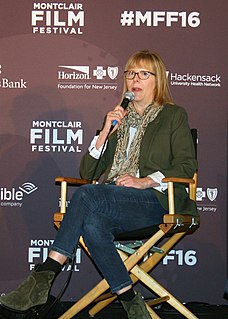A Quote by Romola Garai
When you talk to women who were working as print journalists or in broadcasting in the '50s, and then you talk to women who were working in the late '60s, there's an enormous difference. There had already been a huge transition. Then, of course, you get well into the '70s and there were women with children working.
Quote Topics
Related Quotes
I specially want to have young women not to wait as I did until my children were grown, but young women to come in to gain their seniority so they could be respected leaders at a much earlier age. It's important for all women to see young women who share their experience whether it's as a working mom with young children, who understands the struggle and the aspirations of young women in a similar situation. And if they don't have family and they're pursuing their career women should see that as well.
When I was a kid, a lot of my parents' friends were in the music business. In the late '60s and early '70s - all the way through the '70s, actually - a lot of the bands that were around had kids at a very young age. So they were all working on that concept way early on. And I figured if they can do it, I could do it, too.
When I was growing up in the '50s, I had never heard of a "woman film director," so I did not consider it as an option. But I was fortunate that in the late-'60s and '70s, because of the feminist movement, women were stepping into all sorts of careers that had been closed to them in the past and film was one of them.
It was ironic, but when you scratched the surface, most successful men were working for one thing only--to retire--and the sooner the better. Whereas women were the complete opposite. She had never heard a woman say she was working so she could retire to a desert island or to live on a boat. It was probably, she thought, because most women didn't think they deserved to do nothing.
When Benjamin Disraeli spoke of the 'two nations' in Britain he was perfectly right, only the working classes were not exactly a nation. But the gap in behavioral standards and in outlook, and of course in standards of living, were enormous. And in course of time, at least in countries such as Britain, the working classes more or less adopted and have become assimilated to the standards of the so-called 'gentle' classes. That is assimilation.The working class has hardly been able to govern, but they are no longer outsiders in relation to the state as they were before.
One [paradox] is that pornography follows in that wake of women's liberation. The first instances of hard-core pornography were in late 18th-century in France, "the Golden Age of Women." The next wave in the 20th century comes from Sweden, one of the first countries where women voted. Then Germany, again, at the forefront of progress. Then America in the '80s, when women were closing the pay gap. And Japan, same thing.
My mother never talked about sex. I was on the Dr. Ruth [ Westheimer] show once - this is years and years and years ago - and it was her Mother's Day show. And I didn't know what we were going to talk about but what she decided we were going to talk about was female masturbation. My mother had invited all her girlfriends. And you know these were all women in their late seventy's maybe they were in their eighty's by then and then and they were horrified because Dr Ruth had a little she had a little chart up you know "female masturbation".
I think Hollywood has gone in a disastrous path. It's terrible. The years of cinema that were great were the '30s, '40s, not so much the '50s...but then the foreign films took over and it was a great age of cinema as American directors were influenced by them and that fueled the '50s and '60s and '70s.



































